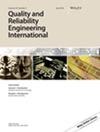Stochastic modeling and optimization of turbogenerator performance using meta‐heuristic techniques
IF 2.8
3区 工程技术
Q3 ENGINEERING, INDUSTRIAL
引用次数: 0
Abstract
The objective of this paper is to identify the most sensitive component of a turbogenerator and optimize its availability. To achieve this, we begin by conducting an initial reliability, availability, maintainability, and dependability (RAMD) analysis on each component. Subsequently, a novel stochastic model is developed to analyze the steady‐state availability of the turbogenerator, employing a Markov birth‐death process. In this model, failure and repair rates are assumed to follow an exponential distribution and are statistically independent. To optimize the proposed stochastic model, we employ four population‐based meta‐heuristic approaches: the grey wolf optimization (GWO), the dragonfly algorithm (DA), the grasshopper optimization algorithm (GOA), and the whale optimization algorithm (WOA). These algorithms are utilized to find the optimal solution by iteratively improving the availability of the turbogenerator. The performance of each algorithm is evaluated in terms of system availability and execution time, allowing us to identify the most efficient algorithm for this task. Based on the numerical results, it is evident that the WOA outperforms the GWO, GOA, and DA in terms of both system availability and execution time.利用元启发式技术对涡轮发电机性能进行随机建模和优化
本文的目的是确定涡轮发电机最敏感的部件,并优化其可用性。为此,我们首先对每个组件进行了初步的可靠性、可用性、可维护性和可依赖性(RAMD)分析。随后,我们开发了一种新的随机模型,采用马尔可夫出生-死亡过程来分析涡轮发电机的稳态可用性。在该模型中,假定故障率和维修率遵循指数分布,并且在统计上是独立的。为了优化所提出的随机模型,我们采用了四种基于种群的元启发式方法:灰狼优化算法(GWO)、蜻蜓算法(DA)、蚱蜢优化算法(GOA)和鲸鱼优化算法(WOA)。这些算法通过迭代提高涡轮发电机的可用性来找到最佳解决方案。我们从系统可用性和执行时间的角度对每种算法的性能进行了评估,从而为这项任务找出了最有效的算法。根据数值结果,WOA 在系统可用性和执行时间方面明显优于 GWO、GOA 和 DA。
本文章由计算机程序翻译,如有差异,请以英文原文为准。
求助全文
约1分钟内获得全文
求助全文
来源期刊
CiteScore
4.90
自引率
21.70%
发文量
181
审稿时长
6 months
期刊介绍:
Quality and Reliability Engineering International is a journal devoted to practical engineering aspects of quality and reliability. A refereed technical journal published eight times per year, it covers the development and practical application of existing theoretical methods, research and industrial practices. Articles in the journal will be concerned with case studies, tutorial-type reviews and also with applications of new or well-known theory to the solution of actual quality and reliability problems in engineering.
Papers describing the use of mathematical and statistical tools to solve real life industrial problems are encouraged, provided that the emphasis is placed on practical applications and demonstrated case studies.
The scope of the journal is intended to include components, physics of failure, equipment and systems from the fields of electronic, electrical, mechanical and systems engineering. The areas of communications, aerospace, automotive, railways, shipboard equipment, control engineering and consumer products are all covered by the journal.
Quality and reliability of hardware as well as software are covered. Papers on software engineering and its impact on product quality and reliability are encouraged. The journal will also cover the management of quality and reliability in the engineering industry.
Special issues on a variety of key topics are published every year and contribute to the enhancement of Quality and Reliability Engineering International as a major reference in its field.

 求助内容:
求助内容: 应助结果提醒方式:
应助结果提醒方式:


